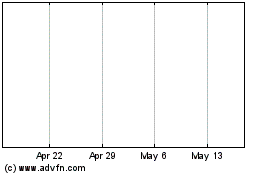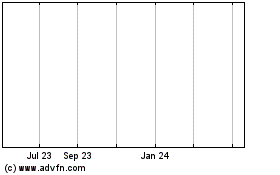Treasury's Lew Calls on Countries to Boost Growth
October 08 2015 - 9:20PM
Dow Jones News
LIMA, Peru—The world's finance officials must avoid resorting to
"beggar-thy-neighbor" policies to revive growth, U.S. Treasury
Secretary Jacob Lew said Thursday as economic leaders confronted an
increasingly dour outlook for the global economy.
Mr. Lew, meeting with counterparts from around the world, called
on countries to overhaul their economies and boost spending if they
have room in their budgets. Finance officials have committed "not
to undertake competitive devaluation, not to rely excessively on
one policy tool—monetary policy," he told reporters as the
International Monetary Fund's annual meeting kicked off here.
The IMF this week cut its forecast for global growth to its
lowest level since the financial crisis and warned that rising
risks in emerging markets threatened to trigger dangerous turmoil
in financial markets and stall global growth.
"When you look around the world, the question is still the
same," Mr. Lew said. Policy makers have the capacity to help boost
growth, but "it's a test for all our political systems to determine
whether we have the political will."
Uncertainty about the world's second-largest economy, China,
triggered turbulence across global markets in recent months.
International officials are uncertain whether the Chinese
government will carry out promised policy overhauls meant to
liberalize its economy. Many officials worry Beijing's decision in
August to change its exchange-rate policy—a move that triggered a
sharp drop in the value of the yuan—could end up being a long-term
depreciation instead of more toward a more market-oriented
currency.
China's move was followed by currency depreciation in other
countries, from Vietnam and Kazakhstan. Japanese officials also
mentioned the need to weaken the yen, feeding worries that
Beijing's depreciation might have sparked a dangerous round of
global currency friction.
U.S. officials also are concerned that European and Japanese
policy makers are relying too heavily on monetary policy that
depreciates the euro and yen.
"There's a question of using all the policy levers," Mr. Lew
said. "There's certainly more that could be done on both demand and
structural reform" in both economies, he said.
"Clearly there's capacity to do more, the question is, will
they?" the secretary said.
Mr. Lew pointed to an agreement on international taxation backed
by the Group of 20 leading economies meeting late Thursday. Just as
countries should avoid undercutting other economies by devaluing
their currencies, he said U.S.-backed efforts to fight global tax
evasion would prevent countries from using tax systems that
undercut other nations' revenue collection.
The Treasury secretary said U.S. lawmakers should support the
economy by pressing ahead with transportation funding, restoring
funding for the Export-Import Bank and passing key budget
measures.
Congress has also undermined U.S. foreign policy and American
influence by not ratifying a 2010 deal that would update the IMF's
governance to reflect the growing power of emerging markets and
boost the crisis-fighter's lending reserves, U.S. officials have
said.
"It's very much in the U.S. economic and national interest for
Congress to act" on all those measures, Mr. Lew said.
Subscribe to WSJ: http://online.wsj.com?mod=djnwires
(END) Dow Jones Newswires
October 08, 2015 21:05 ET (01:05 GMT)
Copyright (c) 2015 Dow Jones & Company, Inc.
Treasury Group Ltd (ASX:TRG)
Historical Stock Chart
From Mar 2024 to Apr 2024

Treasury Group Ltd (ASX:TRG)
Historical Stock Chart
From Apr 2023 to Apr 2024
